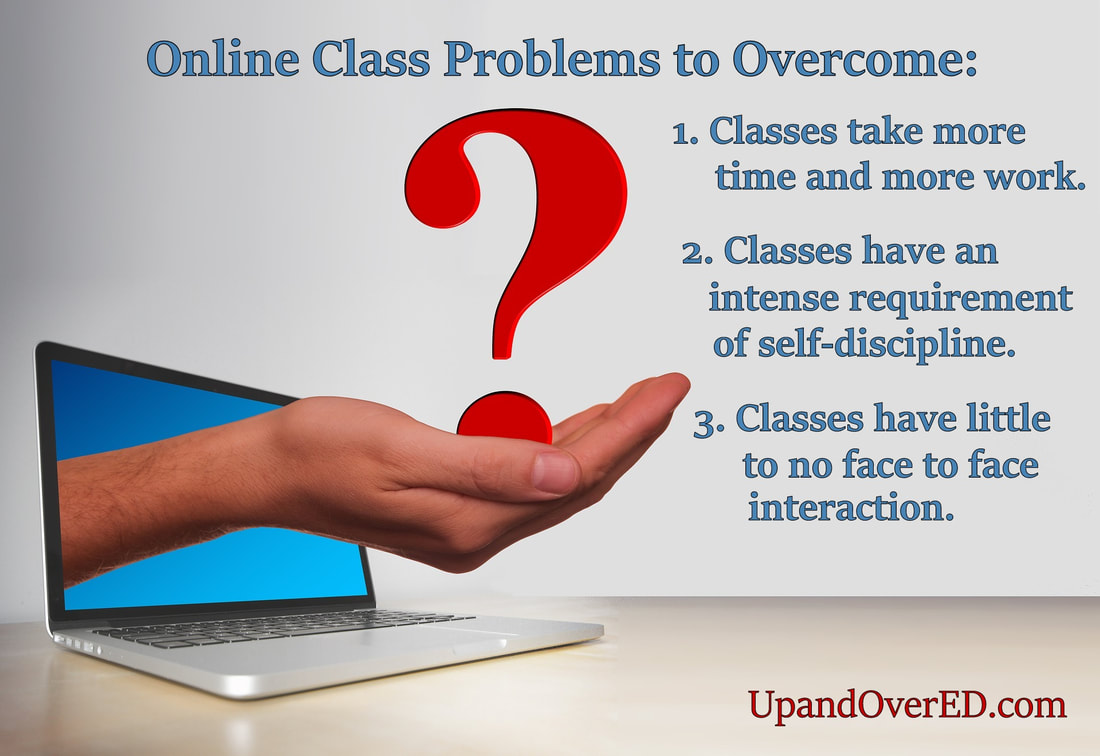| There is a world of new educational options available today, and many students are beginning to take more of their courses online instead of in a classroom setting. While online classes allow a student to work on their own time schedule and skip the commute to school and from class to class, many parents are finding that their kids – |
– especially junior high and high school students – are struggling.
Three of the biggest problems with online classes are:
1. More Time and More Work:
Online courses typically require more assignments and a lot more reading than traditional classes. This may be particularly difficult for students whose learning modalities do not favor visual learning and who do not retain what they read very well. And because there is no in-person instructor to assess the completion of learning goals, students have to do more to prove they have mastered the material. Many courses require at least ten hours a week of work, with some requiring even more.
Three of the biggest problems with online classes are:
1. More Time and More Work:
Online courses typically require more assignments and a lot more reading than traditional classes. This may be particularly difficult for students whose learning modalities do not favor visual learning and who do not retain what they read very well. And because there is no in-person instructor to assess the completion of learning goals, students have to do more to prove they have mastered the material. Many courses require at least ten hours a week of work, with some requiring even more.
| 2. Intense Requirement for Self-discipline: As I mentioned in an early blog about late bloomers, the brains of many students in their teens do not have a fully developed executive function, and they often lack the ability to manage their time and organized their assignments. |
They often cannot figure out how to allot the appropriate amount of time to complete each task. Teens also tend toward procrastination, and they need an accountability partner, either from a parent or an outside source.
3. Little to No Face-to-face Interaction:
Studying online is lonely. Sometimes there are instructors and other students in online classes, but building relationships with them is difficult. Students – especially those who are auditory learners who learn best through discussion – need someone to talk to about the concepts they are learning. Again, these students need more help with their online classes.
The other issue is that students often cannot complete the given assignments because they have past gaps in their knowledge, and the online courses do not (and cannot) address those issues. Again, these students need more in-person help to fill in the gaps.
What Can Be Done?
Salman Kahn, the innovator behind the Kahn Academy, has written a book called The One World School House where he discusses the concept of a “Flipped Classroom.” The premise is that students do their introductory “lecture” learning online, but then work with an instructor to do problem solving and discussion in person.
3. Little to No Face-to-face Interaction:
Studying online is lonely. Sometimes there are instructors and other students in online classes, but building relationships with them is difficult. Students – especially those who are auditory learners who learn best through discussion – need someone to talk to about the concepts they are learning. Again, these students need more help with their online classes.
The other issue is that students often cannot complete the given assignments because they have past gaps in their knowledge, and the online courses do not (and cannot) address those issues. Again, these students need more in-person help to fill in the gaps.
What Can Be Done?
Salman Kahn, the innovator behind the Kahn Academy, has written a book called The One World School House where he discusses the concept of a “Flipped Classroom.” The premise is that students do their introductory “lecture” learning online, but then work with an instructor to do problem solving and discussion in person.
| I was on the Cuesta College Campus this week and walked by the learning center where they offer tutoring. The reason colleges have tutoring centers on campus is because learning through lectures is not enough. When a student goes to tutoring, they are basically experiencing a “Flipped Classroom” model. |
The student may have listened to a lecture in person at a traditional school, or they may have watched some videos and read some online material in a computer based course, but either way, they have had an initial introduction to the information. The second step is to work through problem solving assignments with a teacher who can give instant feedback – something students need to be able to master the material.
In online courses, students sometimes find that they have worked really hard – going the wrong direction – and then need to start over. This wastes time, energy and motivation leading to discouragement. With someone guiding the class for the student, these frustrations can be minimized.
The courses with the greatest challenges have to do with math because neither the online program nor the student can realize when a student is having a problem with a math gap from a long past math concept such as multiplying with a reciprocal when dividing fractions. The student continues to miss the answers to problems, and the computer course cannot help.
| Parents can definitely fill the role of teacher and mentor to their children, but often parents are busy working and keeping the household going, and they just do not have the time. Also, when it comes to teenage sons, these young men are ready to make a break from mom in particular, and she usually is not the best person to be an educational accountability partner at this stage of parenting. |
We all want to provide the very best education for our children, and online courses can play an important part in that process. However, it is important to realize that with the benefits of flexibility and reduced commutes come the challenges of time management, self-discipline and the need for in-person feedback. Tutoring can help.
Wishing you joy on the journey,
Debra Newby
www.UpandOverED.com
Debra Newby is a credential teacher in biology and chemistry, an academic tutor, a life coach and a parent mentor on California’s Central Coast. If you would like more information on the ways she can help you navigate the adventure of raising children, please contact her at [email protected]
Wishing you joy on the journey,
Debra Newby
www.UpandOverED.com
Debra Newby is a credential teacher in biology and chemistry, an academic tutor, a life coach and a parent mentor on California’s Central Coast. If you would like more information on the ways she can help you navigate the adventure of raising children, please contact her at [email protected]




 RSS Feed
RSS Feed
